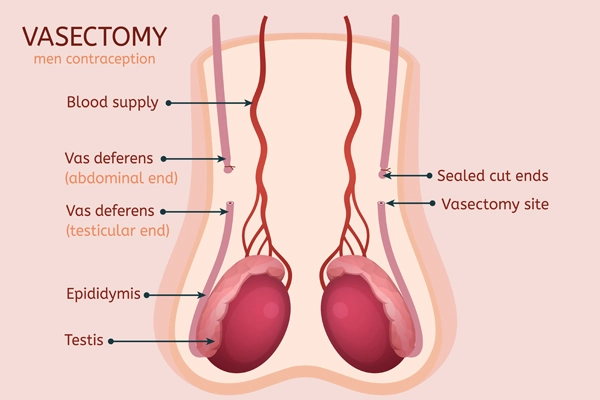What is Vasectomy?
Vasectomy is a standard surgical procedure that serves as a form of male
contraception. It involves cutting or blocking the vas deferens, the tubes that carry sperm from
the testicles to the urethra. By interrupting the pathway for sperm, vasectomy prevents the sperm
from mixing with the semen and being ejaculated during sexual intercourse. This safe and effective
procedure has become an increasingly popular choice for couples who have decided not to have any
more children or for individuals who wish to share the responsibility of contraception with their
partners.
Indications of Vasectomy:
The primary indication for a vasectomy is permanent male sterilization. It's
intended for individuals or couples who are sure that they do not want to conceive any more children.
Vasectomy is considered a long-term and irreversible method of birth control. It's essential for
individuals to carefully consider their decision and be sure about their reproductive choices before
undergoing the procedure.
Who will treat for Vasectomy:
Urologists typically perform vasectomies, who are
specialized doctors with
expertise in the male reproductive system. Before considering a vasectomy, it's advisable to have an
initial consultation with a urologist to discuss the procedure, its implications and address any
questions or concerns. It's also good to consult with your primary care physician or a family planning
clinic for guidance and referrals to qualified urologists.
Preparing for Vasectomy:
Preparing for a vasectomy involves physical and mental readiness. During the
initial consultation, the urologist will discuss the procedure, explain the techniques, and review the
potential risks and benefits. It's essential to be transparent about your medical history, any
medications you're taking, and any existing health conditions.
Leading up to the procedure, your urologist might provide specific
instructions, such as discontinuing certain medications that could increase bleeding risk. Also,
arrange for someone to drive you home after the procedure, as you may experience discomfort that could
impair your driving ability.
Recovery after Vasectomy:
After the procedure, you'll be monitored for a short while to ensure no
immediate complications. Some discomfort, swelling, and bruising in the scrotal area are joint and can
be managed with over-the-counter pain relievers and supportive underwear.
Recovery time varies, but most individuals can return to work and light
activities within a few days. It's recommended to avoid strenuous activities, heavy lifting, and
sexual activity for about a week to allow for proper healing. Your urologist will provide personalized
post-operative care instructions.
Lifestyle Changes After Vasectomy Procedure:
Vasectomy doesn't significantly impact your overall lifestyle. You can continue
your routine once you've fully recovered. However, it's essential to remember that vasectomy doesn't
provide immediate contraception. Sperm can remain in the vas deferens and reproductive tract for some
time after the procedure. It's crucial to use an alternative form of birth control until your
urologist confirms the absence of sperm through follow-up tests.

